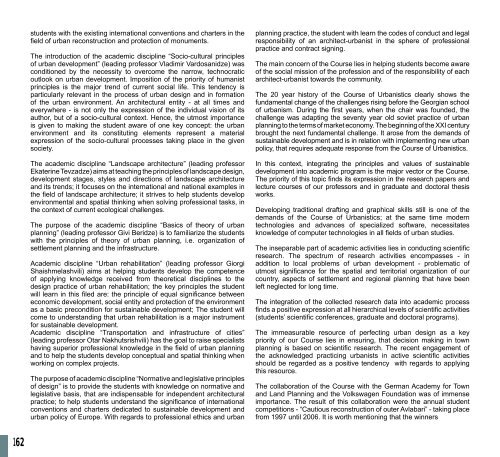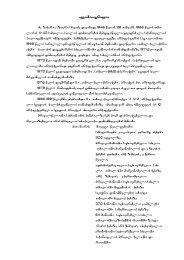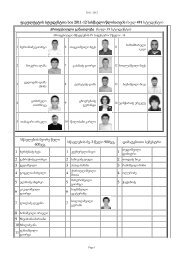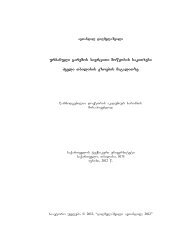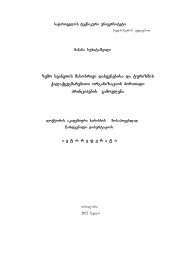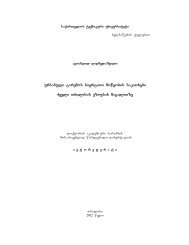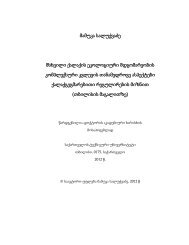COURSE IN URBAN DESIGN (URBANISTICS)
COURSE IN URBAN DESIGN (URBANISTICS)
COURSE IN URBAN DESIGN (URBANISTICS)
You also want an ePaper? Increase the reach of your titles
YUMPU automatically turns print PDFs into web optimized ePapers that Google loves.
students with the existing international conventions and charters in thefield of urban reconstruction and protection of monuments.The introduction of the academic discipline “Socio-cultural principlesof urban development” (leading professor Vladimir Vardosanidze) wasconditioned by the necessity to overcome the narrow, technocraticoutlook on urban development. Imposition of the priority of humanistprinciples is the major trend of current social life. This tendency isparticularly relevant in the process of urban design and in formationof the urban environment. An architectural entity - at all times andeverywhere - is not only the expression of the individual vision of itsauthor, but of a socio-cultural context. Hence, the utmost importanceis given to making the student aware of one key concept: the urbanenvironment and its constituting elements represent a materialexpression of the socio-cultural processes taking place in the givensociety.The academic discipline “Landscape architecture” (leading professorEkaterine Tevzadze) aims at teaching the principles of landscape design,development stages, styles and directions of landscape architectureand its trends; it focuses on the international and national examples inthe field of landscape architecture; it strives to help students developenvironmental and spatial thinking when solving professional tasks, inthe context of current ecological challenges.The purpose of the academic discipline “Basics of theory of urbanplanning” (leading professor Givi Beridze) is to familiarize the studentswith the principles of theory of urban planning, i.e. organization ofsettlement planning and the infrastructure.Academic discipline “Urban rehabilitation” (leading professor GiorgiShaishmelashvili) aims at helping students develop the competenceof applying knowledge received from theoretical disciplines to thedesign practice of urban rehabilitation; the key principles the studentwill learn in this filed are: the principle of equal significance betweeneconomic development, social entity and protection of the environmentas a basic precondition for sustainable development; The student willcome to understanding that urban rehabilitation is a major instrumentfor sustainable development.Academic discipline “Transportation and infrastructure of cities”(leading professor Otar Nakhutsrishvili) has the goal to raise specialistshaving superior professional knowledge in the field of urban planningand to help the students develop conceptual and spatial thinking whenworking on complex projects.The purpose of academic discipline “Normative and legislative principlesof design” is to provide the students with knowledge on normative andlegislative basis, that are indispensable for independent architecturalpractice; to help students understand the significance of internationalconventions and charters dedicated to sustainable development andurban policy of Europe. With regards to professional ethics and urbanplanning practice, the student with learn the codes of conduct and legalresponsibility of an architect-urbanist in the sphere of professionalpractice and contract signing.The main concern of the Course lies in helping students become awareof the social mission of the profession and of the responsibility of eacharchitect-urbanist towards the community.The 20 year history of the Course of Urbanistics clearly shows thefundamental change of the challenges rising before the Georgian schoolof urbanism. During the first years, when the chair was founded, thechallenge was adapting the seventy year old soviet practice of urbanplanning to the terms of market economy. The beginning of the XXI centurybrought the next fundamental challenge. It arose from the demands ofsustainable development and is in relation with implementing new urbanpolicy, that requires adequate response from the Course of Urbanistics.In this context, integrating the principles and values of sustainabledevelopment into academic program is the major vector or the Course.The priority of this topic finds its expression in the research papers andlecture courses of our professors and in graduate and doctoral thesisworks.Developing traditional drafting and graphical skills still is one of thedemands of the Course of Urbanistics; at the same time moderntechnologies and advances of specialized software, necessitatesknowledge of computer technologies in all fields of urban studies.The inseparable part of academic activities lies in conducting scientificresearch. The spectrum of research activities encompasses - inaddition to local problems of urban development - problematic ofutmost significance for the spatial and territorial organization of ourcountry, aspects of settlement and regional planning that have beenleft neglected for long time.The integration of the collected research data into academic processfinds a positive expression at all hierarchical levels of scientific activities(students’ scientific conferences, graduate and doctoral programs).The immeasurable resource of perfecting urban design as a keypriority of our Course lies in ensuring, that decision making in townplanning is based on scientific research. The recent engagement ofthe acknowledged practicing urbanists in active scientific activitiesshould be regarded as a positive tendency with regards to applyingthis resource.The collaboration of the Course with the German Academy for Townand Land Planning and the Volkswagen Foundation was of immenseimportance. The result of this collaboration were the annual studentcompetitions - “Cautious reconstruction of outer Avlabari” - taking placefrom 1997 until 2006. It is worth mentioning that the winners162


